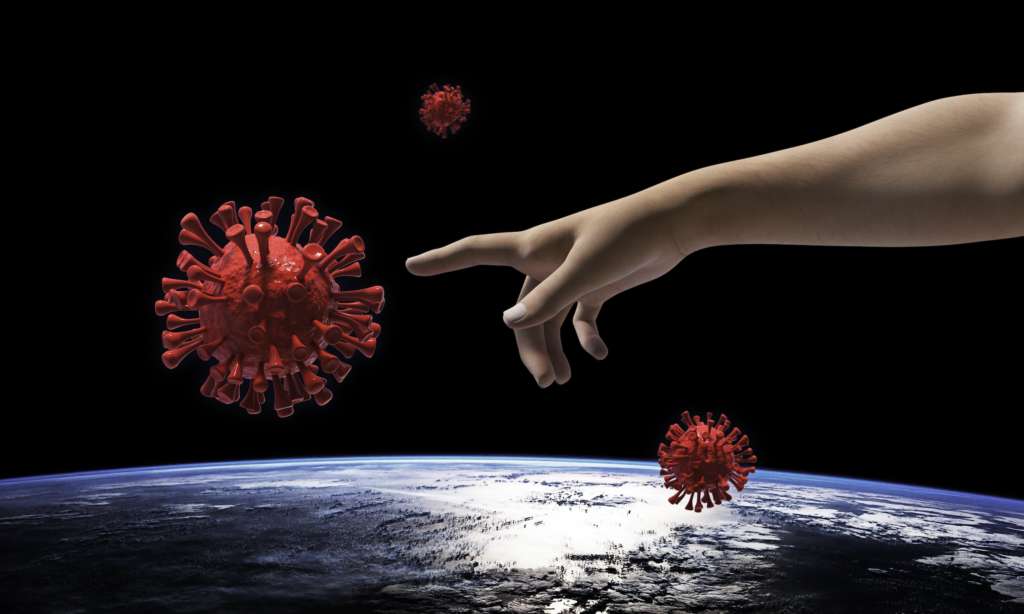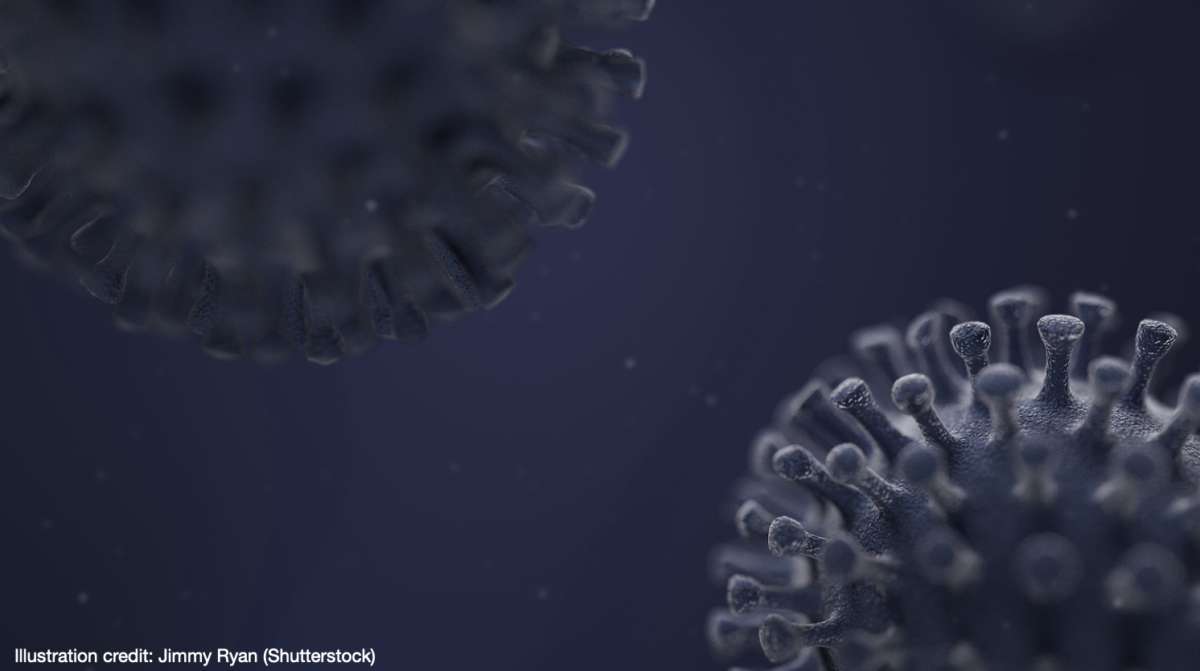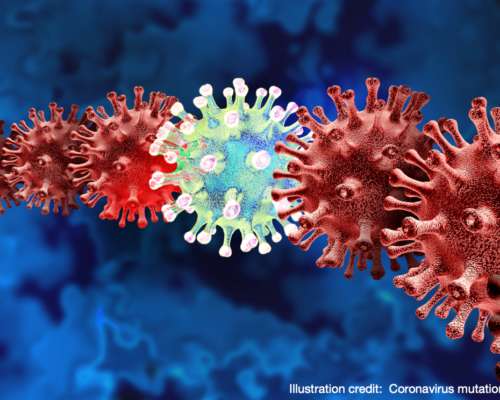This may seem to be an outrageous question to some, and not everyone will agree with my conclusions. To address the primary question, I believe we need to examine some secondary questions as well, specifically (a) Is God capable of creating the Coronavirus? (b) Did He create it, and (c) if so, then why did He create it?
Could God have created the SARS-CoV-2 Coronavirus?

In this post I’ll also touch on healing and those who are not healed as well as pain and why God allows physical pain.
If the Chinese virologists (or American virologists for that matter) can enhance and even weaponize viruses through gain of function techniques and technology, then certainly God can manipulate components of a virus as well. However, the creative process in the world ended on the Sixth Day, so the emergence of a new and deadly virus is just the particular reconfiguration of genes, existing nitrogenous bases, nucleoproteins, and so on. SARS-CoV-2 was a virus found in bats that somehow jumped the species barrier into man, either thanks to man or aside from man.
Did God create the SARS-CoV-2 Coronavirus?
So, did God manipulate these fundamental bases (adenine, cytosine, guanine and uracil) into a deadly “brew?” Maybe not, but I believe that it is possible that He did, or He at least allowed it to happen (else we’d have a lot more empty ICU beds available in America at the moment.) Some SARS-CoV-2 researchers marvel at the potential of the virus, the many useful improvements that have emerged thus far (“improvements,” that is, from the perspective of the virus), and these scientists believe that the COVID-19 virus could very well be the product of “intelligent design.” Intelligent design is a code word for God when discussing evolution, but viruses can be enhanced (improved) in a lab by virologists, and that is intelligent design as well (as opposed to random progression) because it is purposeful.
So, if “a” and “b” are true, what is the answer to “c”? Unfortunately, that is the imponderable mystery. In Matthew 5:45 we read “For he gives his sunlight to both the evil and the good, and he sends rain on the just and the unjust alike…” Whether rain is welcome or not, both the just and unjust, the good and the bad, the holy and the profane get wet. Christians are not being spared from the effects and consequences of the Virus despite prayers on their behalf. However, that is not to say that prayers are not effective. It just suggests—at least to me–that God heals some that he loves and not others that He also loves equally. Why? Why not heal all Christians? Or, why not heal everyone on the planet for that matter? How can a loving God allow death and suffering?
God is not just like us
What I’ve just written is human reasoning at work and it makes perfect sense to us as humans to be indignant, questioning. David addresses this reasoning in Psalm 50:21, but in a different context when God informs us that “you thought I was exactly like you.” We think God was exactly like us—easy going, a “nice guy.” God does not think as we do. He is not exactly like us. If something we do brings us pleasure or gratification (e.g., playing “Red Dead Redemption” or flirting at the office), we may think that God is pleased with us. Or, if we buy a lotto ticket, we hope that God will help us win the jackpot. When a nation goes to war against another nation because they were attacked, every actor tends to believe that God is on their side. But is He? Or, does He not take sides? I had a friend in 2012 who was unhappy that Barak Obama won re-election. My friend thought that God had somehow “lost” to the Democrats because my friend believed that Mitt Romney was the better candidate. God’s candidate. We cannot understand God’s purposes because we cannot know them. Isaiah writes (55: 8,9):
“For my thoughts are not your thoughts,
neither are your ways my ways,”
declares the Lord.
As the heavens are higher than the earth,
so are my ways higher than your ways
and my thoughts than your thoughts.”
So then “how can a loving God allow death and suffering?” My answer is “I just don’t know.” I do know we live in a wicked, fallen world–a vale of tears through which we go. I know that babies die because their mothers are wacked out on meth or flake. Is that God’s fault? Is He a cosmic life guard or “fixer” whose job is to rescue us from the consequences of our action every time we mess up? Or, do we bear a responsibility for someone injured because we were driving while drunk, or a death of an infant because the parent left a child in a hot car during the summer?
God does not heal everybody

God in his infinite love, wisdom and benevolence does not heal everyone today, nor does He spare everyone who is ill from death. I know that and you know that (or you should.) If you think Isaiah 53:5 is a promise that every Christian with some acute or chronic disease will be physically healed in this life because of the Cross, then you need to find a different way to understand and apply the verse, because it “ain’t happening” as far as I can tell. God did not heal Paul from his affliction. It was God’s plan that Paul continue with his thorn in the flesh, and He let Paul know that (II Corinthians 12ff.) To be fair though, we cannot be one hundred percent certain today that the “thorn” in Paul’s flesh was a disease, though most trusted sources and Christians through the ages seem to think so.
There is no reason to blame the victim for a lack of faith if they are not healed. Will a medically-retired servicemen who stepped on an improvised explosive device (IED) in Iraq and who lost his legs below the knee grow new legs? Can God regenerate these limbs? Certainly. Does He, though?
So, let’s be frank and admit that there are reasons that we do not know of, which place constraints on everyday miracles today. There are miracles today, however (else, why would we pray?) The greatest miracle is probably regeneration when the Holy Spirit takes up residency in our life.
Consider the blind man in the Gospel of John:
“As he went along, he saw a man blind from birth. His disciples asked him, ‘Rabbi, who sinned, this man or his parents, that he was born blind?’
‘Neither this man nor his parents sinned,’ said Jesus,’but this happened so that the works of God might be displayed in him. As long as it is day, we must do the works of him who sent me. Night is coming, when no one can work. While I am in the world, I am the light of the world.‘
After saying this, he spit on the ground, made some mud with the saliva, and put it on the man’s eyes. ‘Go,’ he told him, ‘wash in the Pool of Siloam’ (this word means ‘Sent’).
So the man went and washed, and came home seeing.
His neighbors and those who had formerly seen him begging asked, ‘Isn’t this the same man who used to sit and beg?’ Some claimed that he was.
Others said, ‘No, he only looks like him.‘
But he himself insisted, ‘I am the man.‘
“How then were your eyes opened?” they asked.
He replied, ‘The man they call Jesus made some mud and put it on my eyes. He told me to go to Siloam and wash. So I went and washed, and then I could see.‘”
The blind man in John, Chapter Nine who was sightless from birth could not have been healed until that day that Jesus passed by, because it was important that the works of God might be displayed in him. That was his destiny from birth–to live as a blind person until he eventually received his sight. I understand this to refer to Jesus healing him, and that miracle would be written by John in his gospel for your edification. Imagine how much prayer his family and friends might have invested through the years, but the time was not ripe in his life for a healing.
And why did Jesus have to spit in the dirt to heal him? As a human, that makes absolutely no sense to me, but then this is how God sometimes works.
The dead will rise–just not yet
I remember when the revival in Indonesia was occurring (in the ‘sixties.) There were signs and wonders present, water turned into wine, healing, including, some said, raising of the dead. The claims of resurrections were never proved, and I know of no one who was ever biologically dead for hours, yet along days, who rose or was restored in my lifetime. I do know of people who were clinically dead for five minutes or more who were resuscitated. I also am aware of near-death experiences. I understand what cold water drowning is with its death-like presentation, and I once saw a coroner hastily declare a small girl dead after less than ten minutes submerged under the ice (without any attempt at resuscitation) because he could not locate a pulse. But that was long ago, before there was the research and literature that we have today on the phenomena.
Pain and suffering may be important
What about pain and suffering? I’ve worked in hospitals in my life, and sometimes doctors must do very painful things to patients. I remember a teenager who was transported to the ER one day with a broken leg. He was riding a motorcycle on a street past some parked cars, when suddenly, the door to one car opened in his path, and he wrecked, breaking his leg. The orthopedic surgeon met the patient in the ER, and said to him bluntly “I’m going to have to put a pin through your leg and that will hurt, and then I’m going to have to hang some weights on it, and that will hurt even more.” The patient was already in severe pain. What kind of doctor would compound that pain? Six weeks later the fracture healed, and there was no pain. I’ve also seen many patients with acute abdomens pleading for pain medication. But if you’re trying to rule out appendicitis, you cannot give them any pain relief until the diagnosis is positively determined. How can a doctor be so cruel and unsensitive, preferring to leave their patient in torment? The answer is simple, though patients do not always understand it: It is because any applied pain relief might cloud the clinical presentation to the patient’s ultimate harm. Debriding burns is another very painful experience. We used to give patients MSO4 (morphine) before each procedure and the pain would still break through.
Pain is a necessary experience when you injure yourself. Pain tells you that something is wrong and forces you to “guard” the injured limb or organ. Let me explain what happens otherwise. I knew a patient once getting dialysis who had severe diabetes (probably a condition that led to the renal failure.) Something that many diabetics must deal with is a condition called neuropathy, where a person perceives different sensations in the affected area of the body, or they perceive no sensation at all. This person’s neuropathy affected their feet. The person stepped on a nail or sharp object, but was unaware of it. Given the person’s elevated glucose levels which serve as an excellent growth medium for bacteria, this unfortunate soul developed an infection and lost their foot. Had they been able to feel the pain when their skin was broken, they might have been able to seek medical care immediately and the chance of saving their infected foot might have been greater.
Bargaining with God
The older I get, the more determinist I become (determinism is the notion that most things are preordained. The opposite of determinism is indeterminism, which means people can change the course of events in their life. Most people are a little of both.) Determinism fits nicely with election and the perseverance of the saints, however. Nevertheless, Abraham’s encounter with God in Genesis 18 as God was on the way to Sodom tells me that it may be possible in some circumstances to “bargain” with God, or at the very least that God will hear you out.
In 1633, the people of Oberammergau, Bavaria promised God they would perform a passion play once each decade forever if He spared them from the Black Death. Immediately after their pledge, no one else succumbed to the plague and those who were already stricken recovered. It’t doesn’t always work that way, though it is possible that God decided to honor their vow and kept future epidemics from infecting the people of that city.
My personal experience with my late wife’s death suggests (at least to me) that there is certain life expectancy assigned to us before we are born or at birth, but that it is possible in some cases for that to be amended somewhat if God permits. As with Hezekiah. Hezekiah’s situation is explained in Isaiah 38, and God added fifteen years of life beyond what was preordained for Hezekiah. So, there is a Scriptural precedence to my understanding (or personal epiphany as I call it.)
Is the SARS Coronavirus a wake-up call?
Why did God allow 9/11 to happen, or why this pandemic? Some Christians saw the attacks on 9/11 as a warning to America, and I believe that is a real possibility. I don’t want to throw stones here at this group or that group, because the Bible is quite clear on God’s expectations of us and what sin is. But “Yes!” It might have been a wake-up call. This present pandemic might be a warning of even worse viruses just over the horizon, and that we need to prepare even now, starting with repentance. But until Americans are willing to value the lives of others like they value their own lives, then sadly we may pay an equal or greater cost when that next disaster hits. I can say this with personal and absolute confidence, and that is if the COVID virus was configured by God and set loose, then He had a reason and that it was likely the best if only way to accomplish His purpose. It is likely the least drastic means He had.
Live and walk in humility
I think it’s important that we as Christians be humble during this pandemic, though we should not live in fear. We should petition God for his mercy and deliverance and be thankful each day that we’re spared. Nor should we wish this pox on others, or rejoice when some poor deluded soul in denial is stricken, having placed his trust in some medicinal preparation intended to deworm horses and cows. I have no wish to add more pain to the grief and suffering of 650,000 COVID-19 widows and orphans in the U.S. by saying “It could have been worse.” Still. possibly many millions of other Americans have been spared death from this SARS virus because to date, it has limitations to its transmissibility and lethality. Imagine if it were Ebola or the Plague that we are dealing with? Or a disease that strikes the very young with the same, deadly effect as it has had on the very old? So, I see the Hand of God at work in this pandemic, and (figuratively) hear His voice speaking to the Virus in some sense “This far and no more.”
God is sovereign
As Christians, we believe that God is fundamentally good, and merciful to those who ask for it, but He is also sovereign. As C.S. Lewis put it, “Aslan is not a tame Lion.” You don’t need to be a Calvinist to appreciate that God is sovereign, and He can do as He wishes. Robert Browning rather coarsely addresses this notion is his poem “Caliban upon Setebos”
“’Thinketh, such shows nor right nor wrong in Him,
Nor kind, nor cruel: He is strong and Lord.
‘Am strong myself compared to yonder crabs
That march now from the mountain to the sea;
‘Let twenty pass, and stone the twenty-first,
Loving not, hating not, just choosing so.’”
This poem is not about stoning crabs, incidentally, or even the stone crabs you find in seafood restaurants. I read a true story about a young man lost in the Amazon. After several weeks of starving while eating what leaves and bugs he thought safe, he came upon a large tortoise. A feast to a dying man. But he says that just as he picked up a rock to dispatch the tortoise, it looked up at him with sad eyes, and he just could not kill it. He’d rather face starvation for another day. He had the sovereign right to kill and eat it, but he chose to spare the beast. I think this is what Caliban is saying in Browning’s poem. Within that small patch of jungle, the young, lost Israeli tourist was sovereign.
So regardless of the origin of the SARS-CoV-2 virus, and regardless of the particular variant we’re being threatened with, whether delta or mu, we have certain assurances that God will preserve us, whether in this life or the next. And live each day as if it were our last.





Leah Chrest
September 6, 2021This is a wonderfully written post! I was “told” months ago that I would lose my husband, that it would soon be his time and I needed to accept it. I feel Brett’s presence strongly with me even though he is no longer physically here and, because of the way everything played out, see God’s hand, even in what the world would view as tragic. I agree–no clue if COVID is God-designed, but it certainly could be. Regardless, I absolutely trust God’s plan and design for my life, making myself a willing servant in whatever he has in store for me in whatever length life is before me. I trust that he won’t give any of us more than we can handle. His ways are far beyond ours and we grow the most/suffer the least when we can submit our will to his and trust in his love and provision.